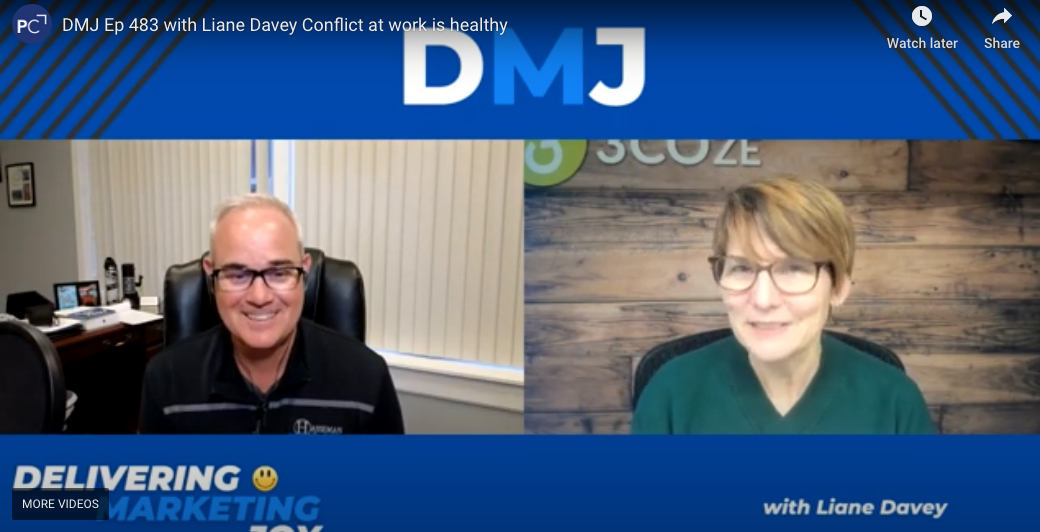Delivering Marketing Joy is an award-winning interview show that helps marketers level up. Each week, Kirby Hasseman interviews the best and brightest minds in marketing to help you level up. This time on Lessons from DMJ, Kirby talks with Liane Davey about why conflict can be healthy at work. Watch now!
In this insightful discussion, Liane Davey, renowned author of “The Good Fight,” sheds light on the often misunderstood concept of conflict in the workplace. She argues that not only is conflict inevitable in any organization, but it can also be a healthy and productive force if managed correctly. Davey’s perspective challenges the conventional wisdom that conflict is inherently destructive and should be avoided at all costs. Instead, she presents a compelling case for embracing conflict as a catalyst for innovation, risk mitigation, and robust discussions about trade-offs.
Throughout the video, Davey provides practical advice on how to navigate conflict effectively, emphasizing the importance of feedback, the use of different managerial tools, and the art of handling difficult conversations. She also underscores the importance of reflection and follow-up after these conversations. This article delves into these key points, providing a comprehensive summary of Davey’s enlightening discussion.
Defining Conflict
At the heart of Davey’s discussion is a nuanced definition of conflict. She describes conflict as the struggle between incompatible needs and wishes, a natural occurrence in any environment where diverse individuals work together. Importantly, she clarifies that conflict does not necessarily involve negative behavior or bullying. Instead, it can lead to productive discussions about trade-offs, fostering a culture of open communication and mutual respect.
Moreover, Davey posits that conflict can be a potent source of innovation and risk mitigation. When employees feel comfortable expressing differing opinions and challenging the status quo, it can spark creative solutions and preempt potential problems. This perspective reframes conflict as a valuable resource for organizations, rather than a problem to be eradicated.
Giving Feedback
Another key theme in Davey’s discussion is the role of feedback in managing conflict. She defines feedback as providing novel information about the impact of behavior on others. This is crucial because most people lack self-awareness and may not realize how their actions affect their colleagues. By focusing on the impact of behavior, rather than passing judgment, feedback can be a powerful tool for personal growth and improved interpersonal dynamics.
According to Davey, feedback can be positive or negative, but it should always provide insight and value. It’s not about criticizing or praising for the sake of it, but about helping individuals understand the consequences of their actions and how they can improve. This approach to feedback fosters a culture of continuous learning and mutual respect, where employees feel valued and empowered to grow.
Different Managerial Tools
Davey also explores the use of different managerial tools in dealing with conflict and providing feedback. She emphasizes that feedback is subjective and suits situations with different choices. However, other tools like instruction, coaching, advice, and evaluation can also be effective, depending on the situation.
Instruction provides specific guidance on tasks or processes, while coaching helps individuals think differently and find new ways to achieve their goals. Advice draws from personal experiences to help others avoid mistakes, and evaluation assesses contributions relative to standards or objectives. By using these tools judiciously, managers can effectively navigate conflict and foster a positive work environment.
After Difficult Conversations
Finally, Davey discusses the importance of what happens after difficult conversations. She advises ending the conversation with a resolution or a thank you to tie a bow around it. This provides closure and reaffirms the value of the conversation, even if it was challenging.
She also emphasizes the importance of following up with any commitments made during the conversation. This demonstrates integrity and accountability, reinforcing trust within the team. Lastly, Davey encourages reflection on the conversation’s impact and expressing gratitude for the relationship. This helps to maintain a positive relationship, even in the face of conflict.
Conclusion
In conclusion, Liane Davey’s discussion provides a fresh perspective on conflict at work, arguing that it can be healthy and lead to productive outcomes. By giving effective feedback, using different managerial tools, and handling difficult conversations effectively, organizations can foster a positive work environment where conflict is seen not as a threat, but as an opportunity for growth and innovation.
You can find all of the content we create on our blog page here. And if you want to create a marketing campaign that truly Hits The TARGET, check our FREE TARGET Marketing Playbook here.





